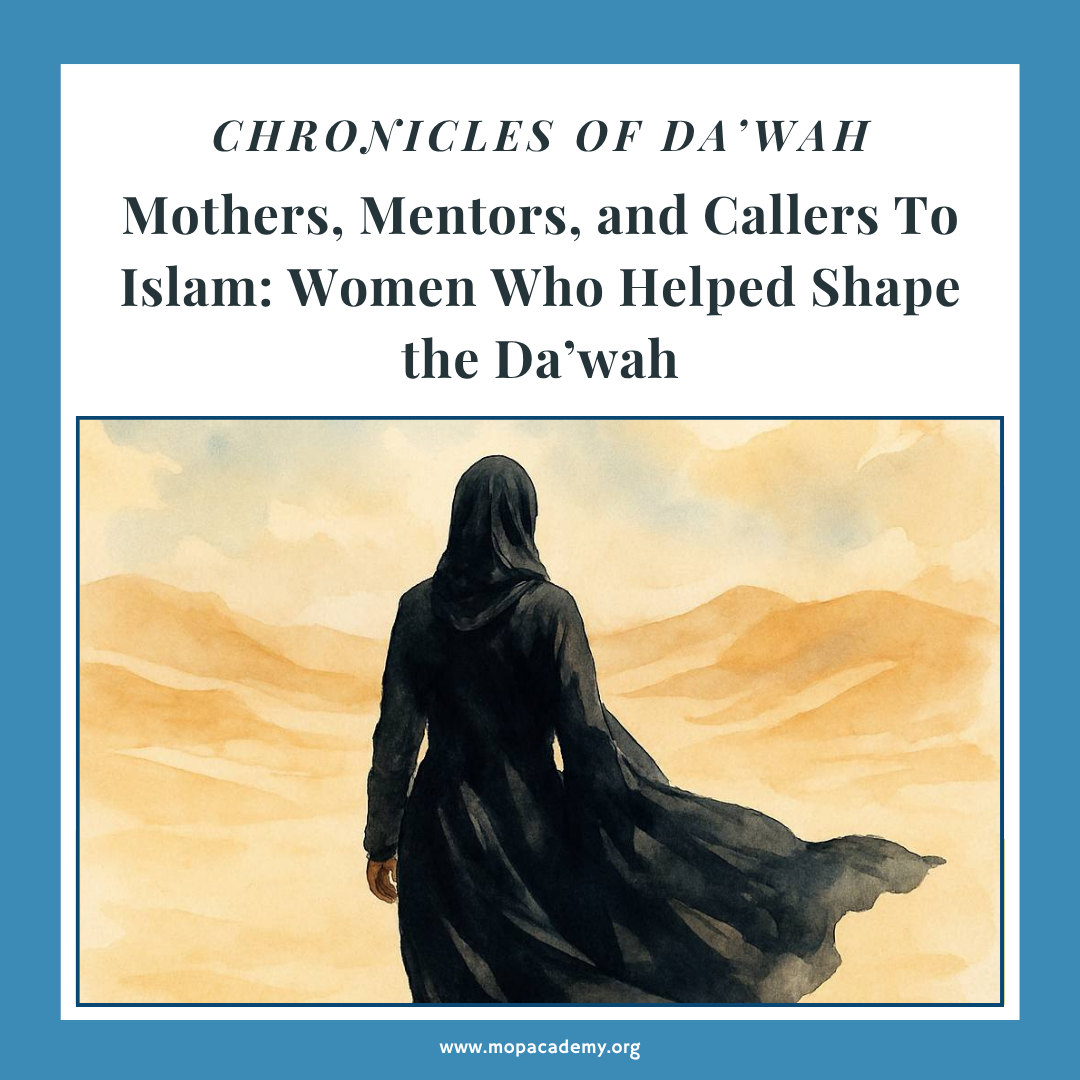
Blog entry by Sam Sam

Celebrating women who shaped Islamic outreach through the ages.
Khadījah bint Khuwaylid (ra)
Khadījah was the wife of the Prophet ﷺ when the first revelation descended in the cave of Hira. In those moments of fear and awe, she held him close, offering words that steadied his heart: “By Allah, He will never disgrace you.” She became the first person to accept Islam, opening her home and wealth to support the mission. Through her wisdom and influence in Makkah, she invited others to the new faith, standing beside the Messenger ﷺ when he was most vulnerable. Her presence was a shield, her trust a comfort, and her generosity a lifeline for the earliest Da’wah.
ʿĀ’ishah bint Abī Bakr (ra)
Married to the Prophet ﷺ in the Madinan period, ʿĀ’ishah grew to become one of the most important transmitters of his words and actions. Her sharp mind and remarkable memory allowed her to preserve over two thousand ahadith, shaping Islamic scholarship for generations. She taught men and women alike, corrected misunderstandings among the Companions, and conveyed the intimate details of the Prophet’s ﷺ character. Her home became a place where knowledge was sought, and her teaching touched every corner of the ummah.
Umm Salamah (ra)
Known for her insight and calm judgement, Umm Salamah was a wife of the Prophet ﷺ whose advice helped guide key moments in the Da’wah. At Hudaybiyyah, when tension and uncertainty gripped the companions, her counsel to the Prophet ﷺ provided a way forward, breaking a deadlock that could have escalated. Her words carried weight because they were rooted in deep understanding and genuine care for the mission.
Al-Shifā’ bint ʿAbdullāh (ra)
Among the few women of her time who could read and write, al-Shifā’ used her skills to teach literacy in Madinah. She was trusted by the Caliph ʿUmar (ra) to advise on public matters, and some reports mention her supervision of the marketplace, ensuring fairness and honesty in trade. Her influence combined knowledge, integrity, and public trust - qualities that turned everyday community life into a platform for Da’wah.
Nusaybah bint Kaʿb (Umm ʿUmārah) (ra)
Nusaybah’s name is remembered on the battlefield of Uhud, where she stood defending the Prophet ﷺ with her own body, sustaining wounds in his protection. Her courage was not for recognition, but for loyalty to the Messenger ﷺ and his mission. She showed that Da’wah is not only in words, but also in the steadfast actions that safeguard the deen when it is under threat.
Ḥafṣah bint ʿUmar (ra)
Ḥafṣah, daughter of ʿUmar ibn al-Khaṭṭāb (ra) and wife of the Prophet ﷺ, became the custodian of the master written copy of the Qur’an after its compilation in the time of Abū Bakr (ra). This entrusted role ensured that the Revelation was preserved with utmost care. Through her guardianship, the words of Allah were safeguarded for all generations to come.
Sayyida Nafīsa (d. 208 AH)
A descendant of the Prophet ﷺ, Sayyida Nafīsa settled in Cairo, where her home became a beacon of learning and spirituality. Renowned for her worship and scholarship, she taught Qur’an and fiqh, and even great scholars like Imām al-Shāfiʿī sought her company and supplication. Her influence drew people closer to Allah, not through public oration, but through the gravity of piety and knowledge.
Karīma al-Marwaziyya (d. 463 AH)
Regarded as one of the most authoritative transmitters of Sahih al-Bukhari, Karīma’s reputation for precision and reliability brought students from far and wide. Her role in safeguarding hadith meant that her Da’wah travelled beyond her lifetime, embedded in the isnāds studied across the world.
Umm al-Dardāʾ al-Ṣughrā
In the great mosques of Damascus and Jerusalem, Umm al-Dardāʾ taught scholars, judges, and ordinary worshippers alike. Her gatherings were marked by humility, accessibility, and depth, bridging social divides and uniting hearts upon knowledge.
Fāṭimah al-Fihrī
Living in 9th-century Fez, Fāṭimah used her inheritance to found the al-Qarawiyyīn Mosque-University, which would grow into one of the longest continuously operating centres of learning in the world. Her vision built an institution that became a hub for scholars, travellers, and seekers of knowledge for centuries.
Nana Asma’u (1793–1864)
A scholar and poet in the Sokoto Caliphate, Nana Asma’u mastered multiple languages and used them to teach Islam to women in rural communities. She organised the Yan Taru network - groups of female teachers who travelled to villages, sharing Islamic knowledge in ways that were accessible and relevant to local life.
Every person in this ummah has a role in carrying the message of Islam, whether it is on a public stage or within the quiet corners of a home. Our sisters hold a position of immense value in this mission. With the right intention, even the seemingly ordinary acts - comforting a family member, offering sincere advice, nurturing faith in the hearts of children - become powerful acts of Da’wah. Raising the next generation upon Islam is not a lesser task; it is one of the most vital trusts, shaping the believers who will carry the call long after we are gone.
Women have always been active members of the ummah within the boundaries of Islam. They were respected, honoured, and entrusted with immense responsibilities long before the modern “feminist movement” claimed to advocate for women’s rights. Islam came to uplift the unique strengths of women, recognising their essential role without erasing the distinctions between men and women. In the Prophetic model, both worked together - each in ways that honoured their God-given nature - to advance the mission of calling humanity to Allah.